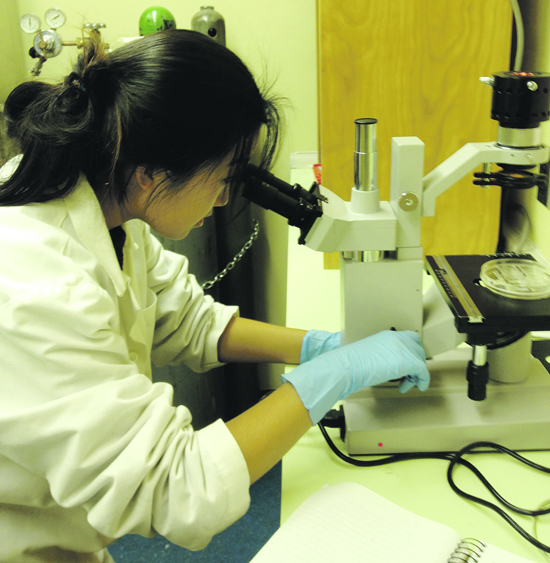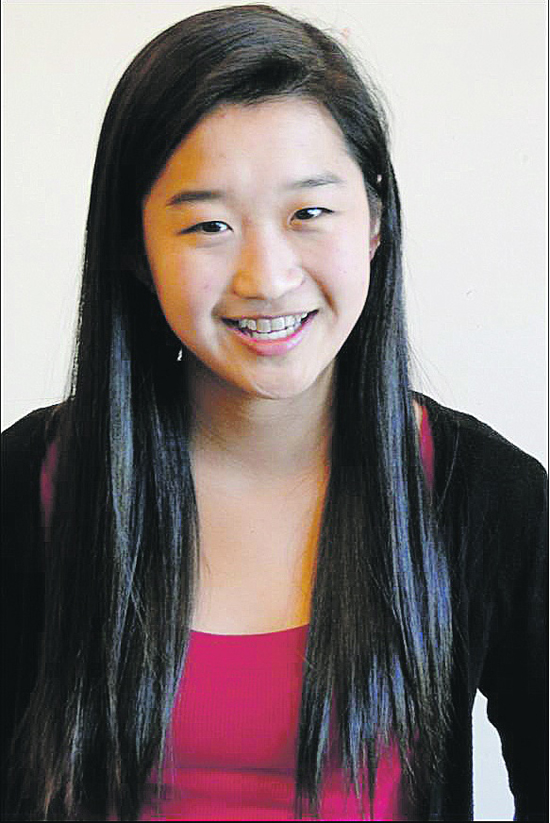| | Published February 13th, 2013
| Orinda Student Named Finalist in Science Talent Search
| | By Lou Fancher |  | | Orinda resident Kelly Zhang at the University of the Pacific lab. Photos provided
|
Orinda's Kelly Zhang, a 17-year-old senior at Oakland's College Preparatory School, shined an eerie, green light into a petri dish, earning an elite position as one of 40 finalists in the 2013 Intel Science Talent Search.
 Since 1942, the Intel STS has brought the nation's brightest high school seniors to Washington, D.C. to present their innovative research projects to recognized, professional scientists in a national forum and competition.
Since 1942, the Intel STS has brought the nation's brightest high school seniors to Washington, D.C. to present their innovative research projects to recognized, professional scientists in a national forum and competition.
 Struck by the real world tragedy of a vigilant cancer that returned to take the life of a friend's father after surgery, Zhang embarked on a nearly three year mission to help surgeons see cancer cells.
Struck by the real world tragedy of a vigilant cancer that returned to take the life of a friend's father after surgery, Zhang embarked on a nearly three year mission to help surgeons see cancer cells.
 "Right now, there's no imaging system to allow them to see," she said. "Surgeons use their hands to feel a tumor. When you open someone up, it's not all laid out like the textbooks show. It's messy, fleshy."
"Right now, there's no imaging system to allow them to see," she said. "Surgeons use their hands to feel a tumor. When you open someone up, it's not all laid out like the textbooks show. It's messy, fleshy."
 Cancer cells left behind, grow, proliferate, and often result in death, she added.
Cancer cells left behind, grow, proliferate, and often result in death, she added.
 Outraged, but characteristically rational, Zhang began to read. "I started with simple articles. Each article linked to another paper and I kept finding out new information," she recalled.
Outraged, but characteristically rational, Zhang began to read. "I started with simple articles. Each article linked to another paper and I kept finding out new information," she recalled.
 Eventually, she pooled her thoughts. Most of the research suggested injecting metals, or synthetic polymers into cancer cells. Nanotechnology - a scientific field involving the manipulation of molecular-scale systems or elements - focused on delivering drugs to tumors.
Eventually, she pooled her thoughts. Most of the research suggested injecting metals, or synthetic polymers into cancer cells. Nanotechnology - a scientific field involving the manipulation of molecular-scale systems or elements - focused on delivering drugs to tumors.
 Zhang knew she couldn't make medicine: her "ah-ha!" moment came when she stumbled upon an article about dyes.
Zhang knew she couldn't make medicine: her "ah-ha!" moment came when she stumbled upon an article about dyes.
 "I had all the articles open, when I realized, I can make a nano and I can add dye to a nano," she said.
"I had all the articles open, when I realized, I can make a nano and I can add dye to a nano," she said.
 Using albumin, a natural blood protein, Zhang made a nanoparticle a thousand times smaller than the width of one human hair.
Using albumin, a natural blood protein, Zhang made a nanoparticle a thousand times smaller than the width of one human hair.
 "I made it in a lab at the University of the Pacific, where Professor Bhaskara Jasti had put me under the oversight of a graduate student. But making a nano isn't the new part," she said, impatient to finish her narrative, "after making it, I added a common florescent dye they had in the lab."
"I made it in a lab at the University of the Pacific, where Professor Bhaskara Jasti had put me under the oversight of a graduate student. But making a nano isn't the new part," she said, impatient to finish her narrative, "after making it, I added a common florescent dye they had in the lab."
 Incubated with cancer and normal cells, Zhang's nanoparticles proved to be tumor receptive. Cancer cell lines glowed green, when viewed through a florescent sensitive camera; normal cells did not. Injected into a cancer patient, an imaging system could significantly improve a surgeon's ability to detect and extract all of a patient's tumor.
Incubated with cancer and normal cells, Zhang's nanoparticles proved to be tumor receptive. Cancer cell lines glowed green, when viewed through a florescent sensitive camera; normal cells did not. Injected into a cancer patient, an imaging system could significantly improve a surgeon's ability to detect and extract all of a patient's tumor.
 Jubilant, Zhang shared her results with her parents, Michelle Sun, a primary care physician, and father Tony Zhang, whose work involves advising small medication formation businesses.
Jubilant, Zhang shared her results with her parents, Michelle Sun, a primary care physician, and father Tony Zhang, whose work involves advising small medication formation businesses.
 "This is a very exciting project, but don't expect to win any prizes," her father cautioned.
"This is a very exciting project, but don't expect to win any prizes," her father cautioned.
 "I am so happy for you, because you initiated this project on your own," her mother told Zhang, hiding her worry that without support, the findings would be a personal, but never a public, victory.
"I am so happy for you, because you initiated this project on your own," her mother told Zhang, hiding her worry that without support, the findings would be a personal, but never a public, victory.
 But Zhang, whose interest in science has blossomed during her high school years, demonstrated the stick-to-itiveness of many a scientist and sent her application to the program run by the Society for Science & the Public. Hers was one of 1,712 entries this year.
But Zhang, whose interest in science has blossomed during her high school years, demonstrated the stick-to-itiveness of many a scientist and sent her application to the program run by the Society for Science & the Public. Hers was one of 1,712 entries this year.
 When the call came in that she had been selected, she was skiing in Bear Valley.
When the call came in that she had been selected, she was skiing in Bear Valley.
 "The call dropped a number of times, but when the lady told me, I was shocked," Zhang said.
"The call dropped a number of times, but when the lady told me, I was shocked," Zhang said.
 "It's a good lesson for both of us," her mother added, "a lesson to never give up."
"It's a good lesson for both of us," her mother added, "a lesson to never give up."
 In March, Zhang will accept the $7,500 award given to 30 finalists, or be selected for one of the larger prizes awarded to 10 of the young scientists. Regardless, she's thrilled to have the opportunity to "talk with other brilliant kids" and to meet top-notch scientists from all over the world.
In March, Zhang will accept the $7,500 award given to 30 finalists, or be selected for one of the larger prizes awarded to 10 of the young scientists. Regardless, she's thrilled to have the opportunity to "talk with other brilliant kids" and to meet top-notch scientists from all over the world.
 Zhang says she is privileged to live in Orinda and is a hybrid, made up of her Chinese and American heritage. "As a Chinese person, I'm willing to work hard, not give up. The American side is more romantic: to dream."
Zhang says she is privileged to live in Orinda and is a hybrid, made up of her Chinese and American heritage. "As a Chinese person, I'm willing to work hard, not give up. The American side is more romantic: to dream."
 Her dreams are guided by the impact of her church, where an outreach travel/work program opened her eyes to living conditions in other countries. And by activities like running, swimming, playing guitar, and developing her website, www.biolabscope.com, where kids without access to labs can learn about science by watching videos.
Her dreams are guided by the impact of her church, where an outreach travel/work program opened her eyes to living conditions in other countries. And by activities like running, swimming, playing guitar, and developing her website, www.biolabscope.com, where kids without access to labs can learn about science by watching videos.
 "I want to be able to be a part of a bigger project," she said. "A medical project that can affect people's lives."
"I want to be able to be a part of a bigger project," she said. "A medical project that can affect people's lives."
 In fact, she already is.
In fact, she already is.

|
 | | Kelly Zhang
| | | | | | | | | | | | | |
| | | print story
Before you print this article, please remember that it will remain in our archive for you to visit anytime.
download pdf
(use the pdf document for best printing results!) | | | Comments | | |
| | | | | | | | | | | | | | | | |



